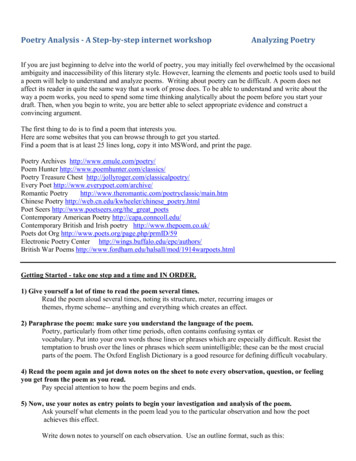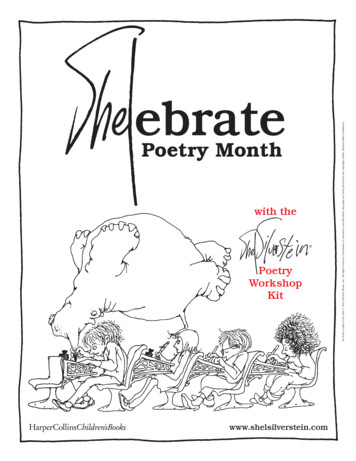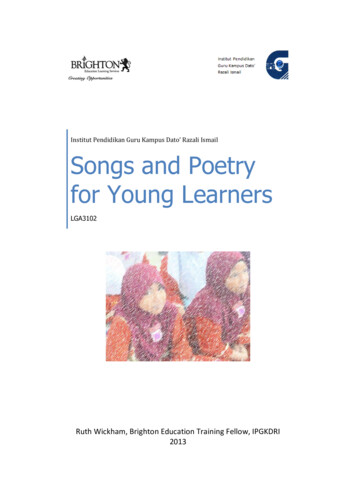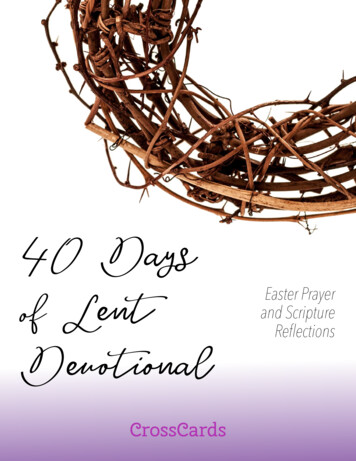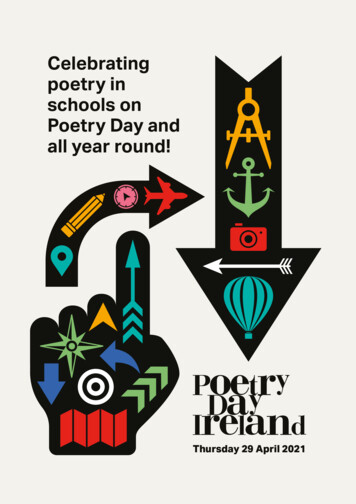
Transcription
POETRY DAY IRELAND 2021Education ResourceCelebratingpoetry inschools onPoetry Day andall year round!Thursday 29 April 2021PAGE 1
POETRY DAY IRELAND 2021Education ResourcePoetry Day Ireland is 29 April and Poetry Irelandis celebrating poetry in schools by offering thisonline collection of inspiring activities and ideas forteachers and children.Packed with poems and fun activities, this vibrantonline resource encourages teachers, childrenand families nationwide to read, write, listen to,illustrate, perform, share – and above all enjoypoetry. This imaginative poetry package, createdand compiled by poet and teacher Enda Wyley,complements the Primary School Curriculum andcan be used not just on Poetry Day, but every day!The following tips and ideas offer childrenthroughout Ireland the unique opportunity toconnect with poetry for pleasure and for life.PAGE 2
POETRY DAY IRELAND 2021Education Resource1 PLANNING FOR POETRY DAYIf poetry is already an integral part of your school life, Poetry Day isa further opportunity to get children enthused about poems and tomake your school a place which buzzes with the power of poetry.How can this be achieved?Share ideas amongst yourselves as teachers and in school about activities thatcould be set in place in preparation for Poetry Day Ireland. Some of these ideasmight include: Reading a poem a day with your class. Having a favourite poem of the week. Making poetry a part of the daily discussions in each class. Poetry Treasure Hunt: This can be organised indoors or outdoors. Print out multiplecopies of poems and hide them. Once the children find them, they make them theirown by decorating them, hanging them up and reading/learning them off by heart. Poetry Tree: This is an activity that can be organised outdoors, using nearby trees.Get the children to cut out leaf shapes from card, write the poems of their choiceon them, laminate them (if possible!) to make them weather proof and usingstring, attach them to branches of trees for everyone to enjoy. Encouraging children to find fun in poems and pleasure in the reading and writingof them.Capturing the Excitement of Poetry DayIn the lead up to Poetry Day Ireland, on the day itself and beyond, celebrate all thefun poetry activities you have created and developed by taking photos, makingvideos, blogs, podcasts, and include all your imaginative work and its outcomes inyour school newsletter and website.What will You have Achieved?Are children and staff reading more poetry? Are they talking about poetry? Are theysharing poetry, illustrating it, performing it and enjoying it more?If the answer is a resounding ‘yes!’ then you have succeeded in making poetry a richcreative source of learning and pleasure within your school and classrooms.PAGE 3
POETRY DAY IRELAND 2021Education Resource2 LET’S START AT THE VERY BEGINNINGHow do you begin to celebrate poetry in your school and classrooms?Here are some fun and simple ideas.A Quote froma WriterThe first poemsI remember werenursery rhymes andplayground rhymes.From the start, Iloved the words, therhythm of them, thenonsense of them you chanted themtogether, made themup together. Theywere fun.Michael Morpurgofrom, Because a Firewas in my Head, 101Poems to Remember(Faber and Faber,2013)The Early Years (4–6 years)The poet Thomas Lynch said that ‘before it is a written or a read thing, poetry is aheard and a said thing.’ The best of poems for children are full of rhythm and rhyme,and they demand to be read or chanted aloud. They can be, in the words of thechildren’s illustrator Quentin Blake, ‘funny and serious at the same time’.Nursery RhymesFrom an early age, children love to be read aloud to. Being expressive andpassionate about the rhymes and poems you read to children is an excellent wayof developing a love in children for poetry - and nursery rhymes are always a greatway to start.Poetry Activities for Younger Children Read, sing or chant nursery rhymes and fun poems to younger children on a dailybasis. Use the rhymes, rhythms and fun of picture books to instil a love of language inyoung readers. Books like The Gruffalo (Julia Donaldson), Owl Babies (Martin Wadell)and The Tiger Who Came to Tea (Judith Kerr) are just some examples of stories thatuse language in an energetic, imaginative and repetitive way which is attractiveto young children. These storybooks are essential in laying important poeticfoundations in the child’s world. Music and movement help bring poems alive. Once young children are familiarwith a poem or rhyme, put music on with a good beat. Ask children to move arounda space in a classroom or a hall, chanting the poem they know to the beat of themusic. By familiarising themselves in this fun way with a poem, children feel ahappy ownership of it.PAGE 4
POETRY DAY IRELAND 2021Education Resource Use objects to create poems. Choose a ‘magic’ object to inspire a word poem e.g.a precious stone. Pick a word from a rhyme or poem that the children like e.g. ‘bear.’Say the word out loud, then pass the object to another child who calls out anotherword connected with ‘bear’ and then he/she passes the object on. Pretty soon, anew word poem has been created to the beat of the music by the class, creating asense of poetic achievement amongst the class. Dream Time: One of the best ways of creating a climate of dreaming is to relax.Get the younger children to sit quietly in a circle. Inhale and exhale. Play gentlemusic if it helps them to chill out. After a while ask them to say what they havebeen thinking. What pictures did they see in their minds? By repeating this practiceevery day, you are giving children the building blocks to dream and to tap into theirinner world. You can also initiate guided dream time, whereby you ask the childrento close their eyes and to tell them they are, for example, entering a forest. Whatcan they see? Hear? Smell? Many of the above ideas can also be used for older children. For example, have funwith older classes getting them to reinvent traditional rhymes. Michael Rosen’s,Hairy Tales and Nursey Grimes has imaginative and hilarious poems that poke fun atwell-known rhymes. Encourage older children to read these cheeky rhymes as away of being inspired to write their own!Enjoying a Fun PoemTHE LOVE SONG OF HARRY HIPPOLarry O’LoughlinHarry Hippo fell in loveone Sunday afternoonand sang his girlfriend love songsbeneath the jungle moon,‘Oh, marry me,’ sang Harry,‘and I’ll cover you in kissesand be so proud when you becomemy hippopotamissus!’PAGE 5
POETRY DAY IRELAND 2021Education ResourceResponding to a PoemAsk the class if they like this poem, ‘The Love Song of Harry Hippo’? Are the soundsfunny? Why do they make you laugh? Tell the children that rhyme is the repetitionof sounds most usually at the end of lines in a poem.Create your Own Nonsense PoemThink up four words that sound the same. Now try to fit them into a poem so thatthey rhyme at the end of every second line. For example, in ‘The Love Song of HarryHippo’ the word ‘afternoon’ rhymes with ‘moon’. Make up words. Be as silly as youlike! Have fun!Irish Poetry Anthologies for the Early YearsSally Go Round the Stars: Rhymes and Songs from an Irish Childhood, ed. by Sarah Webb,Steve Mc Carthy and Claire Ranson (O’Brien Press), and its follow on collectionA Sailor Went to Sea, Sea, Sea, ed. by Sarah Webb and Steve Mc Carthy (O’Brien Press)are two anthologies of poetry which offer lots of Irish and international nurseryrhyme favourites which children will adore, from ‘She’ll be Coming ‘round theMountain,’ to ‘The Owl and the Pussycat’.Hopscotch in the Sky (Little Island and Poetry Ireland) by Irish poet Lucinda Jacob,and beautifully illustrated by Lauren O Neill, offers new poems about the seasonsfor young children.Something Beginning with P, ed. Seamus Cashman (O’Brien Press, 2004) is a uniqueanthology of poems written especially for this collection by Irish poets andillustrated by Irish illustrators, which has many fun poems for the younger reader.(A more extensive reading list of poetry anthologies and collections for children isavailable at the end of this online resource.)PAGE 6
POETRY DAY IRELAND 2021Education Resource3 SIMPLE AND FUN POETRY IDEASFOR CHILDREN (6–12 YEARS)What does Poetry Mean to You?Brainstorm what poetry means to the children in your class by circling the word‘poetry’ on your whiteboard and asking children to offer ideas to write up as anoffshoot from the word.Is it truthful, hurtful, funny, rhythmic, deep, memorable? Can you think of anyother words to describe it? Does poetry help you understand yourself better? Doesit help you make sense of the world that you live in?Get children to make their own list of what poetry means to them and whenfinished, encourage them to read their lists out loud. Everybody has different ideasabout poetry.Remember! There are no rules about how poetry should be defined and there areno rules about how it should be written either!Acrostic PoemRead Gabriel Fitzmaurice’s poem, ‘Imagination’,IMAGINATIONmagination is the thing thatakes you magicndives younspiration to make everythingew,ndonvent things that arenly seen by you, whereothing is impossible. Imagine!Can you write a similar acrostic poem about what poetry means to you?POETRYPAGE 7owerfulutstandingxcitingruthfulhythmicappy!
POETRY DAY IRELAND 2021Education ResourceRead What Poets have to say about PoetryA good book to use as a resource is The Bloodaxe Book of Poetry Quotations, ed. byDennis O’ Driscoll, which is full of interesting comments by poets about what theythink poetry is.A poem has to be the most powerful thing one can say in the shortest space possible.Charles Causley, BBC Radio 4, January 1993My poems almost always start in some kind of memory It’s like a beeper going off in yourmind. Some little thing wakens excitement, and it gets connected with some other things.Ideally, it’s like an avalanche – a little pebble begins to move, gathers a lot of energy andmultiplies itself.Seamus Heaney, The New Mexican, 2003PAGE 8
POETRY DAY IRELAND 2021Education Resource4 MORE IDEAS FOR POETRY DAY IRELANDWe all have our own memories and our own stories to tellAll of our experiences are valid material for writing a poem. Everything thathappens to us is important and can be used as inspiration to write a new pieceof poetry.Making use of a ‘magic’ object as a prompt, pass it around and ask children to sayone thing about themselves. I am ten years of age My address is I have three brothers I love my dog my hobby is swimming, etc.List PoemsPoetry uses language in interesting ways. Encourage the class to now tell a ‘poemstory’ about themselves in an interesting way.Use the form of a list to create a poem about you. Think up an interesting titleSONG OF ME(Example by Enda Wyley)The day I was bornThe wind in my hair as I cycle to schoolThe smile on my Dad’s facewhen I come home from schoolThe sun in my mum’s hairThe warmth of my little brother’s hand in mine Look with your class at Lucinda Jacob’s poem, ‘I Am’. Try writing a poem aboutyourself using animals to create a series of word pictures just like Lucinda has donein her poem. Begin each sentence of your list poem with ‘I am’.I AMI am a tortoise crawling out of bed in the morningI am a cat lapping up my milk at breakfastI am a puppy tumbling in the classroom doorI am an ant pushing my load uphill all dayI am an eagle diving on my snack at breaktimeI am a lizard snoozing in the sun of story timeI am a cheetah racing in the afternoon parkI am a lion roaring at the top of the hillI am a bear with my honey at teatimeI am an owl blinking in the twilightI am a salmon swimming upstream against sleepI am the dreamer with dreams deep as the ocean.PAGE 9
POETRY DAY IRELAND 2021Education ResourceReading AloudReading your own poetry aloud is a great way of celebrating your writing andthe writing of others in your class. When you have written your list poemsabout yourself enjoy sharing them with others by reading them with energy andexpression.What the Poet Says When you read good poetry aloud, your lips pout and stretch, your tongue jives, your wholemouth is vigorously exercised.Michael Longley, Poetry Ireland Review, Summer 1999Our NewsWe often have news time in class – what we did at the weekend, books we haveread, places we have visited, people we have met But the poem, ‘I’ve News for You,’ an anonymous poem, translated by Seán Huttonfrom the ninth-century Irish, found in The Poolbeg Book of Irish Poetry, tells a verydifferent kind of news. Like Lucinda Jacob’s poem, ‘I Am,’ this ancient poem useslanguage in an interesting way. There is an elegant simplicity to this poem whichpaints an imaginative rural image of the poet’s news, set in a place close to his heart.See if you can write a poem which begins, ‘I’ve news for you’. Fill it with wordpictures of a place that you love, and end your poem with the definite line, ‘that’smy news’.I’VE NEWS FOR YOUI’ve news for you;the stag bellows,winter’s snow,summer’s gone;high cold windsun low in sky,short days,heavy seas;deep red bracken’sskeletal form,barnacle goose’scustomed call;PAGE 10cold has seizedthe bird’s wings,icy season;that’s my news.
POETRY DAY IRELAND 2021Education ResourceWe Write What We LikeBe inspired by the poem, ‘I Love These Hands,’ by Queva Zheng, age 14, a studentat Larkin Community College, Dublin 1. By writing about the hands of hergrandparents, Queva tells her own story. This is an imaginative, heartfelt poemand one that is not easy to forget.Be honest and brave like Queva is in her poem and write a poem about the handsof someone you love. Trace your own hands with pencil on paper, cut them out andwrite your new poem within the hand you have drawn. Display the hand poems inthe school and class.I LOVE THESE HANDSI love these hands,The hands of my grandparents.These hands hold my hand,While crossing the road.These hands cook delicious foods,When my brother and I are hungry.These hands hold me up,When I trip over.These hands tie my hair up,During the warm weather.These hands wipe off my tears,When I am sad.These hands reach everything I want,Everything that I cannot reach.I love the wrinkles on these old hands.One day they will be gone,So I need to cherish these hands,Until I cannot see or touch them,Anymore.PAGE 11
POETRY DAY IRELAND 2021Education ResourcePoetry as a Recipe for HappinessWhat makes you happy? Can you capture happiness in a poem?Read Grace Wells’s poem,THE RECIPE FOR HAPPINESSThe recipe for happiness in our houseis to take a cup of flour,and milk, two eggs, a pinch of salt,and whisk for half an hour.Then take the creamy mixtureto the steaming frying pan,ladle little circles in,as many as you can.Watch them all turn gold and brown,then sit down to eat,sugar and lemon on one side,pour maple syrup to complete.Write your own Recipe for HappinessDraw cooking pots on coloured paper. Cut them out and line them. Write your‘recipe’ poem within this pot and decorate it and display. Some of the recipes maybe imaginative but others such as Grace Wells’s poem might be practical and canactually be cooked in class. Enjoy making a pizza or a pancake – or whatever yourrecipe is - to go with your poem!What does not make you happy?Read Catherine Ann Cullen’s poem, ‘The Jellyleg Germ’ (page 31). Nobody likestaking medicine and this is a warm and funny poem on that subject. The structureof this poem is comprised of three four-line verses with each two lines rhyming(A-A, B-B.) Try writing a poem in this structure with rhymes describing in a fun waysomething that you most definitely don’t like!Take a look at the poem, ‘Jellyfish,’ by Gabriel Rosenstock. Does this poem makeyou smile even though it is supposed to be a sad poem? Poetry can be playful andserious all at once!PAGE 12
POETRY DAY IRELAND 2021Education ResourceInspiration from a PoemTake a poem like Julie O’Callaghan’s, ‘Me in a Tree’. Hide the title and ask the classto guess what it might be. As the poet herself changes her mind at the end of thepoem about her original title, this is a perfect poem to use for this activity!Poem PortraitsRead Michael Hartnett’s poem, ‘Death of an Irish Woman’. Concentrate particularlyon the last six lines of this poem.She was a summer dance at the crossroads.She was a card game where a nose was broken.She was a song that nobody sings.She was a house ransacked by soldiers.She was a language seldom spoken.She was a child’s purse, full of useless things.Think of someone you know and love and write six lines about them beginning‘He is ’ or ‘She is ’ If you have photographs of the people you have written aboutbring them in to school. Create a portrait gallery with poems and photographs. Youcould also draw portraits of friends or family that will complement your poems.‘Brother,’ by Jade Byrne, a Transition Year Student from Presentation SecondarySchool, Warrenmount, Dublin 8, is also a great poem. This poem was inspired byMichael Hartnett’s poem. It is a fine example of how a poem by a great poet caninspire a new poem to be written by a young, talented student like Jade Byrne.PAGE 13
POETRY DAY IRELAND 2021Education ResourcePortrait PoemsRead and enjoy the wonderful poem, ‘Lion King’ by Joseph Woods. Look at theimaginative images he uses and how he extends them. The newspaper is ‘flopped/to his feet like a seagull.’ And when the old man ‘wakes from his snooze/ he alwayslooks like a spaceman landed on some strange planet.’ This poem by Joseph Woodsalso ends with a quirky question, ‘Grandad/ were you old before you were old?’Write a poem about your granny or grandad that captures exactly who they are toyou. Try and end the poem with a question that gets us thinking about the personyou are describing.Songs of MagicPoetry is a magical force! If you were to make a witchy stew of words what wouldyou fling in your cauldron? Read and enjoy Mark Granier’s poem, ‘Song of TheFourth (Weirder) Sister.’Use the first line, ‘In my cauldron I will fling ’ to begin your poem and invent abizarre concoction of things to stir into your pot. Invent a two-line rhyming spell toput in the middle of each verse that will be fun to chant.In my cauldron I will flingbits of almost everything,pencil-shavings, tufts of hair,all the paper I can tear,Rumble, rumble, like my tummy,Make this magic thick and gummy,feathers from a dead man’s pillow,old tears from a weeping willow,little weeds that poke and flounce(with Latin names I can’t pronounce)Rumble, rumble, like my tummy,Make this magic thick and gummy PAGE 14
POETRY DAY IRELAND 2021Education ResourceThe Magic of AnimalsThere is a still sense of magic to this beautiful short poem by the Cork poet LeanneO’Sullivan called, ‘Fox.’ What would it be like if you were walking out a lane and youmet a fox? And what would it be like if you and the fox had a conversation? Whatwould you say to each other? Ask the class these questions without showing themLeanne’s poem. Encourage the class to write about encountering a fox – or anyother animal – on a lane. When they have finished their poems and shared themwith each other, then read the poem.Do you like it? Why? Perhaps you did not like this poem? Why?FOXHalfway along the way a fox appearedout of the perishing hedgerows and stoppedon the road in front of him,the lines of her breast straight and clear,fear having fallen away from there.What is she doing? he thought. She said,I am waiting to see what you will do next.That’s funny, he said, beginning to follow,I am doing the very same thing.And that was the way they went, morningafter morning, the hedgerows turningtheir infinite colours, the body with its one fire.PAGE 15
POETRY DAY IRELAND 2021Education ResourcePoetry Writing Exercises Using your SensesExercise 1Sit outdoors for a few minutes with your eyes closed. Write down a record of whatyou have heard around you. Add to the sound any smells you have become aware of- the feel of the grass, concrete about you, the air against your skin, etc. Then openyour eyes completely and add all the things you can see to the record.Exercise 2Keep your notebook next to you as you eat a meal and jot down all that ishappening, as if all you can do is taste. Try to capture the complete sensations oftasting, chewing and swallowing.Exercise 3Take your notebook out for a walk and write down everything that is happeningabout you. Try to build up a flow of ideas and leave no sensation unexplored orunrecorded. Touch, smell everything around you - a railing, hedges, smell newpaint, traffic fumes, a bonfire, etc. Write it all down.Exercise 4At night, leave your notebook by your bed. Read some poems before you sleep.When you wake up, try and capture what you have dreamt. Sometimes this can bedifficult, but keep trying for a few days, to capture at least one dream.Don’t forget! Have fun!PAGE 16
POETRY DAY IRELAND 2021Education ResourceA Poet SpeaksThe Power of WordsIf you’re going towrite a poem ofpolitical protest you have to besure that it’s yoursubject, that it’syour anger, notsomebody else’sanger Read the following two poems by Olivia Barabanchuk and Marc Gijsemans withthe class.Seamus Heaney,Between the Lines,2000WORDSWordsHurt moreThan paper cutsAnd slaps across the faceThey stingMore thanLemon juiceOn open wounds defacedThey litterOur bodiesLike awful scarsReminding of the fightsWe tryTo hideThem through the daysAnd heal on lonely nightsWHATEVERWhatever country we came fromWhatever country we are in nowWhatever language we used to speakWhatever language we speak nowThe sound of our children cryingremains the same.The first poem, ‘Words,’ is a poignant and powerful poem about the hurt thatwords, if used unkindly, can inflict. There is a painful honesty to this poem that isadmirable and impressive given that it is written by a secondary school student.‘Whatever’, the second poem by Marc Gijsemans, is also a painfully honest poemrevealing the horror of being a refugee, driven by war and politics away from yourhomeland.PAGE 17
POETRY DAY IRELAND 2021Education ResourcePoetry Exercise suitable for older children (10-12 years)Poems are other people’s snapshots in which we recognise ourselves.Charles Simic, The Unemployed Fortune-Teller, 1994Bring into class newspaper articles with human interest stories from around theworld. As a group try to imagine living the lives of the people depicted in thesearticles. Write down your thoughts and see do they make a new poem.Is it hard to imagine another person’s life?When you do this, do you feel that you have more empathy for others?PAGE 18
POETRY DAY IRELAND 2021Education Resource5 POEMS OF CELEBRATIONOn Poetry Day Ireland, 29 April 2021, use poetry as a way of celebrating the worldthat we live in. A poem that does this superbly is Brendan Kennelly’s poem, ‘Begin’.Display this magnificent poem in your class. It is a perfect poem to read out loudwith older children. The more they read it, the more this poem will work its wayinto their psyche, becoming a much-loved hymn to our capital city of Dublin. Agreat poem to know off by heart!BEGINBegin again to the summoning birdsto the sight of light at the window,begin to the roar of morning trafficall along Pembroke Road.Every beginning is a promiseborn in light and dying in darkdetermination and exaltation of springtimeflowering the way to work.Begin to the pageant of queuing girlsthe arrogant loneliness of swans in the canalbridges linking the past and the futureold friends passing through with us still.Begin to the loneliness that cannot endsince it perhaps is what makes us begin,begin to wonder at unknown facesat crying birds in the sudden rainat branches stark in the willing sunlightat seagulls foraging for breadat couples sharing a sunny secretalone together while making good.Though we live in a world that dreams of endingthat always seems about to give insomething that will not acknowledge conclusioninsists that we forever begin.PAGE 19
POETRY DAY IRELAND 2021Education Resource6 AND FINALLY THINGS TO REMEMBERIF YOU WANT TO WRITE POEMS Always be curiousAlways keep a notebookLove readingTry and write every dayEnjoy the world around youBe interested in lots of different thingsWhatever you can do or dream you can do. Begin it. Boldness has genius, power and magicin it. GoetheLes Murray said about writing poems:You’ve got to be able to dream at the same time as you think to write poetry. You think witha double mind. It’s like thinking with both sides of your brain at once Poetry is as muchdreamed as it is thought and it as much danced in the body as it is written. It’s done in yourlungs. It’s done in every part of your muscles – you can feel it in your muscles.Keep dreaming!PAGE 20
POETRY DAY IRELAND 2021Education ResourceFollow on Ideas to Poetry Day Ireland 2021Poetry Ireland would love to hear about all the wonderful poetry activities youcreated in your school on the lead up to, and on Poetry Day in April and beyond!Poetry Slams, Poetry Parties, Poetry Aloud, Visiting Poets Don’t forget to record your work, take photos and send your poetry news toPoetry Ireland:writersinschools@poetryireland.ieReading Ideas for your School, Classroom and HomeHere are suggestions of some vibrant and inspiring books of poetry for children forthe poetry shelves in your classrooms, school and home. These are fantastic booksto be read and enjoyed on Poetry Day and all year round! Sally Go Round the Stars: Rhymes and Songs from an Irish Childhood, ed. by Sarah Webb,Steve McCarthy and Claire Ranson (O’Brien Press, 2014) A Sailor Went to Sea, Sea, Sea, ed. by Sarah Webb and Steve McCarthy(O’Brien Press, 2017) Something Beginning with P, ed. by Seamus Cashman, illustrated by Corina Askin andAlan Clarke (O’Brien Press, 2004) Let’s Join In, Shirley Hughes (Walker Books, 2004) Here’s a Little Poem, ed. by Jane Yolen and Andrew Fusek Peters, illustrated by PollyDunbar (Walker Books, 2007) Once Upon A Place, ed. by Eoin Colfer (Little Island, 2017) Hopscotch in the Sky, Lucinda Jacob (Little Island and Poetry Ireland, 2017) All Better! ed. by Inese Zandere, Catherine Ann Cullen and Reinis Pētersons (LittleIsland, 2018) Mustard, Custard, Grumble Belly and Gravy, Michael Rosen (Bloomsbury, 2008) The Puffin Book of Nonsense Verse, ed. and illustrated by Quentin Blake (1997) Singing for Mrs Pettigrew, A Story Maker’s Journey, Michael Morpurgo (Walker Books,2006) Inside Out, Children’s Poets Discuss their Work (Walker Books, 2008) All Day Saturday and Other Poems, Charles Causley (Macmillan, 1995) Red Cherry Red, Jackie Kay (Bloomsbury, 2007) I like this Poem, ed. by Kaye Webb (Puffin, 2016) The Oxford Book of Children’s Poetry, ed. by Michael Harrison and Christopher StuartClark (2007) The Faber Book of Children’s Verse, ed. by Matthew Sweeney (2003) Staying Alive, ed. by Neil Astley (Bloodaxe Books, 2016) The Emergency Kit, ed. by Jo Shapcott, Matthew Sweeney (Faber and Faber, 2004) What is Poetry? The Essential Guide to Reading and Writing Poems, Michael Rosen and JillCalder (Walker Books, 2019)PAGE 21
POETRY DAY IRELAND 2021Education ResourceListening to Poets and PoetryEnjoy listening to poets talk about their work on:The Poetry Programme, RTÉ Radio 1www.rte.ie/radio1/the-poetry-programme/Arena with Séan Rocks, RTÉ Radio 1www.rte.ie/radio1/arena/Words Lightly Spoken Podcast, Poetry Ireland and RTÉ Radio 1http://wordslightlyspoken.libsyn.com/Encounter poets and their works on some of the following websitesThe Poetry Societywww.poetrysociety.org.ukThe Guardian Children’s Books ries/childrens-books-podcastA fun podcast where young and passionate readers quiz their favourite writersPAGE 22
POETRY DAY IRELAND 2021Education ResourceTexts of Poems Used in this Poetry Day Ireland Resource forTeachers and Schools, 29 April 2021THE LOVE SONG OF HARRY HIPPOLarry O’LoughlinHarry Hippo fell in loveOne Sunday afternoonAnd sang his girlfriend love songsbeneath the jungle moon.‘Oh marry me,’ sang Harryand I’ll cover you in kissesand be so proud when you becomemy hippopotamissus.’Something Beginning with P (O’Brien Press, 2004)PAGE 23
POETRY DAY IRELAND 2021Education ResourceIMAGINATIONGabriel FitzmauriceIMAGINATIONmagination is the thing thatakes you magicndives younspiration to make everythingew,ndonvent things that arenly seen by you, whereothing is impossible. Imagine!from Will You be My Friend: New and Selected Poems for the Young and Young at Heart (Liberties Press, 2016)PAGE 24
POETRY DAY IRELAND 2021Education ResourceTHE RECIPE FOR HAPPINESSGrace WellsThe recipe for happiness in our houseis to take a cup of flour,and milk, two eggs, a pinch of salt,and whisk for half an hour.Then take the creamy mixtureto the steaming frying pan,ladle little circles in,as many as you can.Watch them all turn gold and brown,then sit down to eat,sugar and lemon on one side,pour maple syrup to complete.from Something Beginning with P (O’Brien Press, 2004)PAGE 25
POETRY DAY IRELAND 2021Education ResourceI AMLucinda JacobI am a tortoise crawling out of bed in the morningI am a cat lapping up my milk at breakfastI am a puppy tumbling in the classroom doorI am an ant pushing my load uphill all dayI am an eagle diving on my snack at breaktimeI am a lizard snoozing in the sun of story timeI am a cheetah racing in the afternoon parkI am a lion roaring at the top of the hillI am a bear with my honey at teatimeI am an owl blinking in the twilightI am a salmon swimming upstream against sleepI am the dreamer with dreams deep as the ocean.from Hopscotch in the Sky (Little Island and Poetry Ireland, 2017)PAGE 26
POETRY DAY IRELAND 2021Education ResourceI’VE NEWS FOR YOUAnonymousI’ve news for you;the stag bellows,winter’s snow,summer’s gone;high cold windsun low in sky,short days,heavy seas;deep red bracken’sskeletal form,barnacle goose’scustomed call;cold has seizedthe bird’s
Poetry Day Ireland is 29 April and Poetry Ireland is celebrating poetry in schools by offering this online collection of inspiring activities and ideas for teachers and children. Packed with poems and fun activities, this vibrant online resource encourages teachers, children and families nationwide to read, write, listen to,

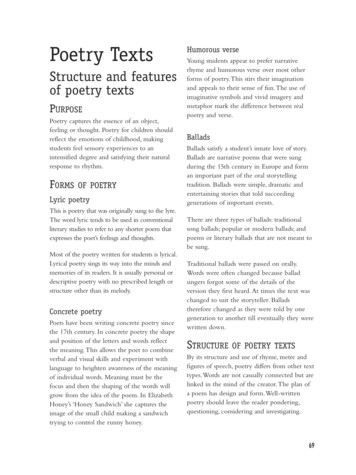
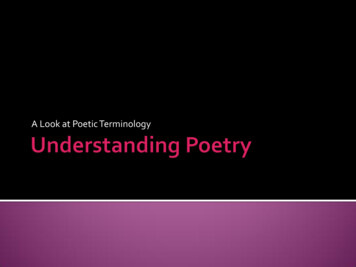
![Welcome [dashdiet.me]](/img/17/30-day-weight-loss-journal.jpg)
